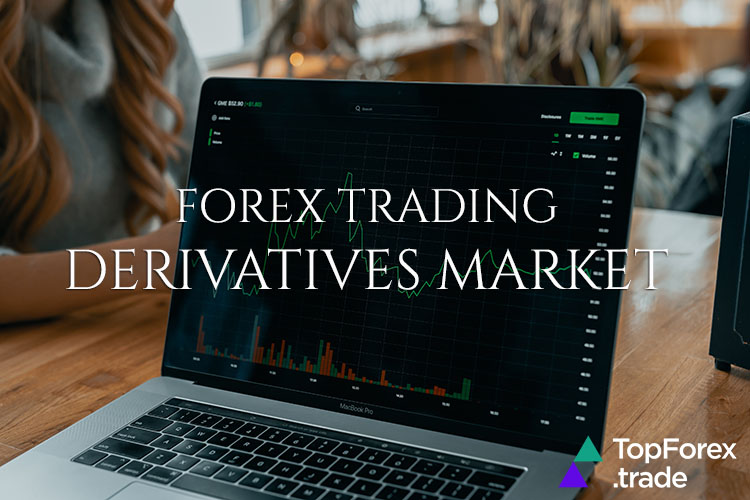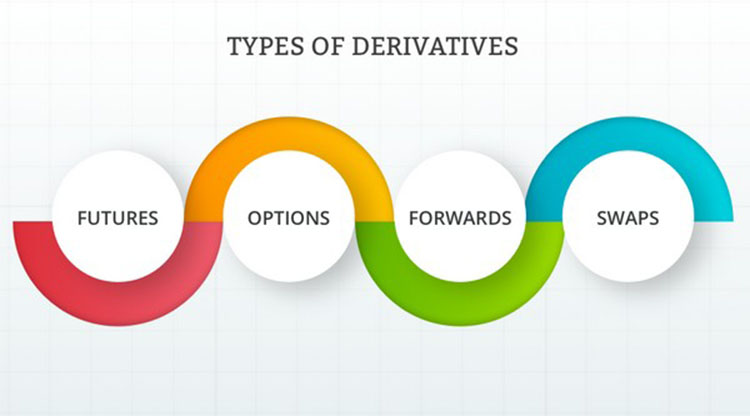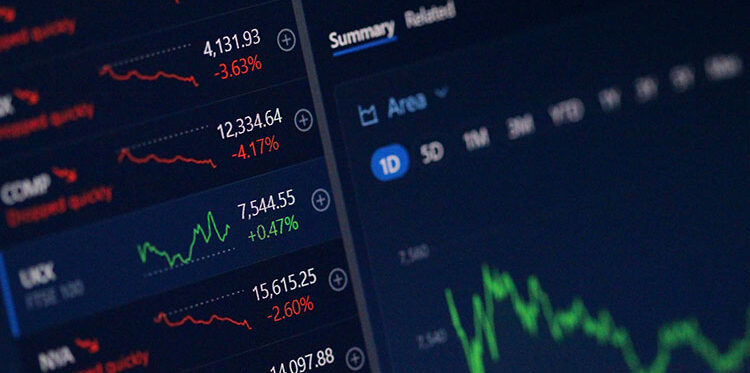What are financial derivatives?

The demand for new methods of exchange trading has created a need for more instruments for operations in financial markets, which, in turn, has led to the emergence of derivatives.
A derivative is an agreement (contract) between two parties to perform a predetermined transaction with a certain underlying asset (stocks, currency, commodities, bonds, stock indices, interest rates, etc.). Typically, these transactions involve the purchase, sale, delivery, or transfer of securities and assets at a predetermined price at a certain time.
Unlike underlying assets, derivatives are traded on the Forex market that has certain terms for contracts.
Differences of derivatives from other exchange instruments are:
- Dependence on the underlying asset;
- The contract establishes the period of its execution;
- Their fixed cost;
- Potentially high returns;
- They are traded with a margin.
Derivatives types in Forex trading

Derivatives are classified by an underlying asset and contract types. Depending on the underlying asset, the following types of derivatives exist:
- Stock derivatives;
- Currency derivatives;
- Commodity derivatives;
In practice, this means that the value of a derivative instrument is directly related to the quotes of the underlying asset at the time of buying or selling the contract.
By type of contract, the most popular derivatives include:
- Futures contracts
- Forward contracts
- Options
- Swaps
Futures are contracts under which the parties undertake to buy or sell a certain amount of the underlying asset at a specified time and at a fixed price. The transaction may involve both actual deliveries of the underlying asset to the buyer and an equivalent financial settlement. Often, contracts don’t involve the delivery of goods but are traded on the stock exchange in order to make a profit on the difference in quotations. In this case, a trader, when purchasing a futures contract, can use leverage. Don’t forget, that leverage in trading comes with the risk of losing more than you invest.
Option contracts are a type of derivative financial instrument for a variety of asset types that give the buyer the right, but not the obligation, to purchase or sell a specific asset for a limited time and at the price set in the option. If the trend moves in an unfavorable direction, the buyer has the right to refuse the transaction, and the seller compensates for the losses with the guarantee fee that he will receive when the option is exercised.
Options contracts are divided into call and put options. The first gives the buyer the right to activate the contract and purchase the asset, and the second – is to sell. In addition, there are two main types of options: European and American. The main difference between the two is the time of the option exercise: the European contract only expires on one predetermined date, which is called the option expiration date. The American option can be exercised any day before the expiration date of the contract.
Forwards or forward contracts are very similar to the futures described above, but with some differences, the main one of which is that futures transactions are concluded on the exchange, and forwards are outside it, and the properties of the goods there are established as a result of an agreement between the parties.
A swap is a two-way exchange of payments that is beneficial to both parties in the transaction. As a rule, one hedge the fall of quotes, and the second ensures against their growth. All currency derivatives are applied in a similar way.
There are also interest rate swaps that allow you to generate income when interest rates change. The first side of the swap is more profitable with a fixed rate, and the second is with a floating one.
Other types of derivative products
In addition to the four main types of derivatives, traders can also choose:
Contracts for Difference (CFDs)
CFDs have a mechanism similar to futures, but with two differences: they don’t provide the delivery of the underlying asset, and also don’t have an expiration date.
Financial warrants
Warrants are derivatives with signs of an option, only the warrant is issued not by the exchange, but by the issuer of the share. The price of the warrant is lower than the value of the option, and the expiration time is longer.
Forward Rate Agreements
FRAs are agreements on future interest rates, which is a type of forward and has the characteristics of an interest rate swap. The FRA derivative ensures participants against changes in interest rates, providing payment of the difference between the interest set by the terms of the contract and the market rate.
Structured products
Structured products are complexes of financial instruments that combine a protective and risk part. For example, the defensive side (90%) could be deposits and government bonds, while the risk side (10%) could be oil futures. In general, a structured product is a derivative, which is a formed investment strategy or a ready-made portfolio compiled for a certain period.
Why do you need derivatives in Forex trading?

The main function of derivatives is risk hedging. For example, by purchasing a futures contract for the oil supply, the buyer has the opportunity to stake out a favorable price for the future. Now buyer doesn’t need oil, but there are worries that in six months the reserves will run out and the cost of commodities will increase. Therefore, the person buys a derivative and waits for the delivery date.
The second function of derivatives is to make a profit on the difference in quotes. Earnings come from changes in value, and not only its increase but also its decrease.
Benefits of derivatives in Forex trading
The derivatives market is attractive for traders and has a number of advantages over other financial instruments and it is worth noting the following:
- Traders can enter a derivative market with a relatively small amount of money;
- It’s possible to make a profit even in a declining market;
- Profit faster with short trades than with underlying assets;
- Save on transaction costs as traders don’t need to pay for the storage of derivatives, while brokerage commissions for such contracts are also very low.
What determines the price of a derivative?
The cost of derivatives is formed under the influence of the following factors:
- Supply and demand. The universal law of the market also works for derivatives: increased demand leads to higher prices, and excess supply reduces quotes.
- Expiration period. The further the expiration, the more expensive the derivative because the possibility of a price change of the underlying asset becomes higher every day.
Derivatives trading in the Forex market

Usually, options and futures contracts, as the least complex and easier to understand derivative financial instruments, are popular with traders. You can speculate on the instrument by reselling currency futures or options or earn on the value of an asset: buy an option to buy a security at a price below the market price, wait for the option to be exercised, and sell the asset at a higher price.
For example, one share of Netflix costs $250. The trader conducts a Fundamental analysis of the market and predicts that in the coming days, the share price will rise to $375. A trader buys a call option and pays a $25 (10%) margin. When the option is exercised and if the price of Netflix shares rises to $375, the trader can buy them at $250. 375-250-25=$100 is the trader’s profit for each share in the option.
If the trader initially had $250, he could buy 10 shares, respectively, his potential profit would be $1000. Now suppose that the trader traded with a leverage of 1:10, then his profit will already be $10000. Remember, using leverage in trading can result in losses greater than your initial investment.
Secure derivatives trading with VPN for Forex

In order to remain anonymous and be completely confident in your security when making derivatives transactions, the best option would be to use Top VPN services for Forex trading. With a VPN, you can buy and sell assets, trade CFDs, options, futures, and other derivatives, follow market trends, and remain anonymous to both other users and the government.
In addition, in cases of direct connection to the network via public Wi-Fi, strong encryption algorithms and data transfer protocols of VPN services will protect important information about the trading account from fraudsters.
Also, if you are faced with geo-blocking sites of various brokers, the VPN service will easily bypass such restrictions and allow you to try trading any financial instruments you want.
Top Forex brokers for derivatives trading
The derivatives market, due to its multidimensionality and flexibility, offers ample opportunities to reduce various kinds of costs and insure risks, at the same time, traders can use this tool to earn money both on an upward and downward price movement for various underlying assets. Derivatives trading can provide much more leverage than stock trading, resulting in higher returns. Remember, using leverage in trading can result in losses greater than your initial investment.
As with any other financial instrument, Fundamental analysis and Technical analysis are the most useful for navigating new markets. If you understand how the derivatives markets work and how they can fit into your portfolio, they can add a welcome diversification to your assets.
Use free demo accounts provided by trusted brokers to test your trading approach with popular stock pairs or other instruments where you can get current market quotes for your trades and a selection of Forex trading indicators. You will also be able to see the market dynamics in real-time and become familiar with the trading tools and terminology.
The Forex brokers listed below have been serving their clients for decades and adhere to the criteria of the most stringent financial regulators in the world, allowing traders to trade all types of underlying assets such as currency pairs, commodities, stocks, indices, and a variety of derivatives.
NAGA Markets derivatives trading
NAGA Markets is an international broker that has the most popular futures such as FTSE 100, DOW 30, NIKKEI 225, and many more in its offer list. In addition, more than 950 instruments and assets are available to traders including forex, stocks, indices, commodities, and ETFs.
NAGA Markets is a trusted broker that is known for all kinds of Copy trading benefits. NAGA Autocopy is an innovative feature that allows you to automatically copy top traders on the platform and learn from their experiences.
In addition, it offers a wide range of trading tools and educational materials to make trading more efficient. The last point is guaranteed by several reputable regulatory bodies, these rules must be followed by NAGA Markets such as the FCA and CySEC.
AvaTrade derivatives trading
AvaTrade, in addition to a variety of financial instruments such as currency pairs, commodities, Cryptocurrencies, and indices, provides Vanilla Options trading, giving traders the right to buy or sell a certain amount of an instrument at a certain price at a predetermined time. When trading Vanilla Options, a trader can control not only the instrument and the amount he trades, but also when and at what price.
In addition to derivatives like options, AvaTrade makes it possible to trade CFDs on currency pairs, leading stock indices, including, for example, the S&P500, commodities (gold, metals, energy, agricultural products), shares of leading global companies, including pre-IPO exchange-traded ETFs. When trading CFD contracts, traders are provided with a leverage of up to 1:200. Don’t forget, leverage in trading comes with the risk of losing more than you invest.
Among the trading platforms available are MT4, MT5, Proprietary, AvaSocial, AvaTradeGo, AvaOptions, and WebTrader. If you do not plan to be tied to a computer, there is always an AvaTrade mobile app.
AvaTrade has a very formidable regulatory base and is licensed by such institutions as IIROC, BVIFSC, FSCA, ASIC, ADGM, FSA, and FFAJ. It also offers such useful platforms and features as AvaSocial and AvaTrade Protection. The first platform is the Copy Trading platform which enables you to copy the performance of successful traders you choose and gain with them the way they trade. The second one provides compensation for losing trades at the end of the month in exchange for a hedging cost you pay to access this tool.
Plus500 derivatives trading (CFDs)
Plus500 provides CFDs on currency pairs, commodities, stocks, indices, and other financial instruments (over 2000 in total), as well as a trading guide and all the tools you need to trade efficiently.
Plus500 clients can trade on the web terminal for PCs and laptops and also have access to the mobile app for Android and iOS. There are two types of accounts: real and demo. The second will give new brokers an ideal opportunity to practice, test their trading skills, and gain important knowledge in real market conditions while remaining completely risk-free.
Plus500 is licensed by the UK Financial Services Authority, the Australian Securities and Investments Commission, the Cyprus Securities and Exchange Commission, and the New Zealand Financial Markets Authority. It is also a regulated financial services provider in South Africa licensed by the Financial Conduct Authority.
82% of retail investor accounts lose money when trading CFDs with this provider. You should consider whether you can afford to take the high risk of losing your money.
XM Group derivatives trading
XM Group is a regulated online broker that offers over 1 000 trading instruments including CFDs on many Cryptocurrencies (Bitcoin, Ethereum, Ripple), Indices, Commodities, Metals, Energy, and Stocks on the MT4/MT5 platforms. The broker has a user-friendly mobile app that allows you to trade with a single login on a demo or live account.
In addition, XM provides customers with a VPS service that allows them not to worry about the speed of the Internet connection, computer problems, or power outages.
XM Group doesn’t take commissions for depositing and withdrawing funds: the broker covers the full cost of payment system commissions. The broker’s trading accounts including Micro, Standard, XM Ultra Low, and Shares have negative balance protection and tight spreads.
XM Group accepts clients from over 150 countries thanks to accreditation from recognized regulatory bodies such as CySEC, IFSC, DFSA, and ASIC. You can try trading in derivatives and other financial instruments by following the link.
eToro derivatives trading
eToro offers excellent trading conditions for CFDs as well as many other financial instruments. Broker has fixed spreads, no hidden fees, and a copy trade tool. Clients can work on the broker’s own trading platform, which is available in two versions: in a personal account, as well as in the eToro app for Android and iOS. In the app, you can deposit and withdraw funds, trade, and candlestick charts, as well as copy trades, and chat with other members.
With over 15 years in the market, the broker has managed to establish itself in the online trading community as one of the most trusted brokers in the industry, as evidenced by its licenses from the FCA, ASIC, and CySEC.
Forex derivatives trading - FAQ